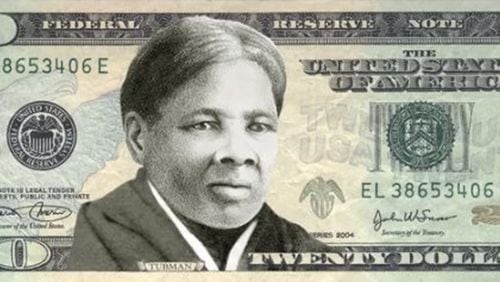Harriet Tubman was born a slave and spent a large part of her life hiding from slave catchers, who saw her as a menace for her part in helping dozens of other slaves escape.
Now, activists and admirers of the woman known as "Moses" are hoping she might one day grace the $20 bill.
On Tuesday, Women on 20s, a group that has been campaigning for months to get a woman featured on paper currency, submitted a petition to the White House urging President Barack Obama to consider replacing Andrew Jackson on the $20 bill with the image of the former slave.
“Our paper bills are like pocket monuments to great figures in our history,” Women on 20s Executive Director Susan Ades Stone said in an e-mail. “Our work won’t be done until we’re holding a Harriet $20 bill in our hands in time for the centennial of women’s suffrage in 2020.”
A black abolitionist known for her role as a conductor on the Underground Railroad, Tubman was one of four finalists selected. A museum in Macon bears her name.
The other finalists were Rosa Parks, who sparked the beginning of the modern civil rights movement; former first lady Eleanor Roosevelt; and Wilma Mankiller, the first female chief of the Cherokee Nation.
The campaign, launched earlier this year by Women on 20s, has inspired legislative proposals in both the U.S. House and the Senate.
Stone said more than 600,000 people voted in the campaign. Tubman earned 118,328 votes, beating out Roosevelt’s 111,227. Parks, who sparked the 1955-56 Montgomery Bus Boycott, finished third.
While the petition in both video and written form was delivered to Obama, it is Treasury Secretary Jack Lew who would ultimately make the final decision about whether to "begin the process of replacing the image of President Andrew Jackson with that of a woman of great stature who played a significant role in American history," Stone said.
“Our work is not over, but our triumph is that the simple truth that women deserve to be valued more in our culture was heard and echoed by young and old, not only across the country, but around the world,” said Women on 20s founder Barbara Ortiz Howard.
It has been nearly a century since the face on paper money was changed in the United States. But there is precedent. In 1928 — for reasons that remain unclear — Grover Cleveland was replaced on the $20 bill by Jackson, the seventh president of the United States.
The slang term for the $20 is a “Jackson.”
Tubman would be the first African-American on U.S. currency and only the second woman. Martha Washington appeared on the face of the $1 Silver Certificate of 1886 and 1891, and on the back of the $1 Silver Certificate of 1896, according to the U.S. Mint.
Replacing Jackson with Tubman would also carry strong irony. Not only did Jackson oppose the use of paper currency, he owned hundreds of slaves who worked on the Hermitage plantation in Nashville.
Born a slave on a large plantation in Maryland, Tubman – who was likely born in 1822 – ran away often and was constantly beaten by her masters because she was rebellious and sickly.
At one point when she was still a child, she was beaten in the head with a heavy metal weight, which caused disabling epileptic seizures and headaches for the rest of her life. She also had visions that she described as revelations from God.
Tubman and her brothers, Ben and Henry, escaped from slavery on Sept. 17, 1849, before briefly returning at her brothers’ urging. She soon left again for good and made her way to Philadelphia using the Underground Railroad.
According to Kate Clifford Larson’s 2003 biography, “Bound for the Promised Land: Harriet Tubman, Portrait of an American Hero,” Tubman rescued approximately 70 people on more than 13 trips back to Maryland.
During the Civil War, she worked for the Union Army as a cook, nurse and, eventually, spy.
Tubman died in 1913.
But for her work during the Civil War, Tubman was given a monthly widow’s pension.
It was for $20.







